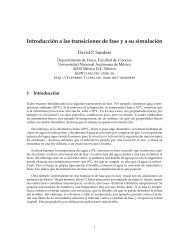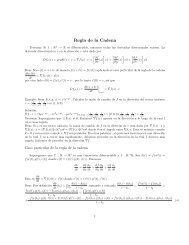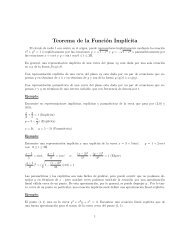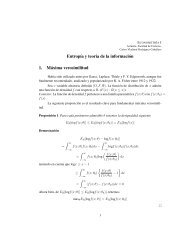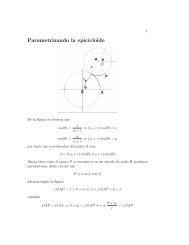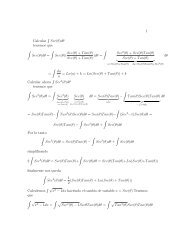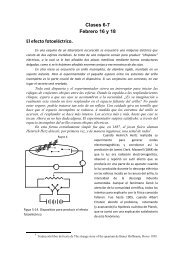"Surely You're Joking, Mr. Feynman!" - unam.
"Surely You're Joking, Mr. Feynman!" - unam.
"Surely You're Joking, Mr. Feynman!" - unam.
Create successful ePaper yourself
Turn your PDF publications into a flip-book with our unique Google optimized e-Paper software.
esults straightened out and were in complete agreement.<br />
I knew that Telegdi was excellent, and it would be hard to go upstream against<br />
him. But I was convinced by that time that something must be wrong with his<br />
experiment, and that he would find it he's much better at finding it than we would be.<br />
That's why I said we shouldn't try to figure it out but just wait.<br />
I went to Professor Bacher and told him about our success, and he said, "Yes, you<br />
come out and say that the neutronproton coupling is V instead of T. Everybody used to<br />
think it was T. Where is the fundamental experiment that says it's T? Why don't you look<br />
at the early experiments and find out what was wrong with them?"<br />
I went out and found the original article on the experiment that said the neutron<br />
proton coupling is T, and I was shocked by something. I remembered reading that article<br />
once before (back in the days when I read every article in the Physical Review it was<br />
small enough). And I remembered, when I saw this article again, looking at that curve<br />
and thinking, "That doesn't prove anything!"<br />
You see, it depended on one or two points at the very edge of the range of the<br />
data, and there's a principle that a point on the edge of the range of the data the last<br />
point isn't very good, because if it was, they'd have another point further along. And I<br />
had realized that the whole idea that neutronproton coupling is T was based on the last<br />
point, which wasn't very good, and therefore it's not proved. I remember noticing that!<br />
And when I became interested in beta decay, directly, I read all these reports by<br />
the "betadecay experts," which said it's T. I never looked at the original data; I only read<br />
those reports, like a dope. Had I been a good physicist, when I thought of the original<br />
idea back at the Rochester Conference I would have immediately looked up "how strong<br />
do we know it's T?" that would have been the sensible thing to do. I would have<br />
recognized right away that I had already noticed it wasn't satisfactorily proved.<br />
Since then I never pay any attention to anything by "experts." I calculate<br />
everything myself. When people said the quark theory was pretty good, I got two Ph.D.s,<br />
Finn Ravndal and Mark Kislinger, to go through the whole works with me, just so I could<br />
check that the thing was really giving results that fit fairly well, and that it was a<br />
significantly good theory. I'll never make that mistake again, reading the experts'<br />
opinions. Of course, you only live one life, and you make all your mistakes, and learn<br />
what not to do, and that's the end of you.<br />
Thirteen Times<br />
One time a science teacher from the local city college came around and asked me<br />
if I'd give a talk there. He offered me fifty dollars, but I told him I wasn't worried about<br />
the money. "That's the city college, right?"<br />
"Yes."<br />
I thought about how much paperwork I usually had to get involved with when I<br />
deal with the government, so I laughed and said, "I'll be glad to give the talk. There's only<br />
one condition on the whole thing" I pulled a number out of a hat and continued "that<br />
I don't have to sign my name more than thirteen times, and that includes the check!"<br />
The guy laughs too. "Thirteen times! No problem."<br />
So then it starts. First I have to sign something that says I'm loyal to the



